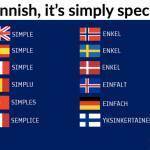What is an effective way to combine people to form a culture? It is a language. In our case unique, rare and a strange-sounding language. Finnish has only more or less 5 million speakers in Finland and minorities in Sweden, Norway, Russia, Estonia and even in the USA, Canada and Brazil according to Wikipedia (Wikipedia. 2017. Finnish language).
A friend of mine once met a man online. He claimed to speak French, English, Italian, Spanish and Finnish. Finnish seemed very odd to this combination. As they were writing to each other in Finnish I was sure that he was using Google translator and just messing around with my friend. It turned out his father was Italian and her mother was Finnish. The family’s children had lived their whole life in France. When I asked him what have been the benefits of speaking almost fluent Finnish he replied ”Not really anything. It has been only useful as a secret language with my siblings. And to communicate with Finnish relatives in Turku”. [He spoke with a strong Turku-dialect with a French intonation which was very amusing to us at
picture1. Oh, how much seeing this picture gives me simple joy. Yksinkertaisuus. (source: Very Finnish Problems. 2017.)
History matters
Languages evolve constantly. New words are invented with modern needs. Other words are getting out of fashion and forgotten. Finnish is a young language comparing to any bigger country and their linguistic heritage. We have our ”100-year independency birthday” coming up this year which amazes people from old countries like Spain, China or Iran. We are a young nation. The first document of a pre-Finnish language, Finnic is a birch bark letter no. 292 from the beginning of 13th century (Endangered languages. 2017). Whereas the earliest examples of Chinese language are divionary inscriptions on oracle bones from around 1250 BCE and Chinese culture is one of the oldest in the world (Wikipedia. 2017). Their country and culture can be traced back thousands of years.
You can only imagine which culture has more history included in their heritage and words describing their historical culture. Does Finnish have different names for its historical eras while Chinese people name different eras according to their rulers? Well, sometimes in the spoken language we may speak about “the times when Kekkonen was the president”, but nothing like long eras like the Chinese have. Short history could be considered as a factor built in our national identity. We don’t have as many national tales of legendary deeds or heroes to pass on to our generations. We have Kalevala, but it isn’t considered as a children’s bedtime story nowadays. Before Elias Lönnrot wrote down this Finnish mythology in the 19th century it was being passed on to generations orally. It has contributed to our storytelling habits and written language, since there was barely any Finnish literature 150 years ago. Usually tales have been considered as an important way to pass on morals to community and children. Therefore each culture has their own kind of stories and heroes which affect the national identity.
A little about the hidden ways how language works to pass on cultural mindset
Back in high school my French teacher used to tell us how one’s mind works with the language one speaks. For example in Finnish we say I miss you ”Ikävä sinua” or ”Ikävöin sinua”. This could be translated more like ”I am yearning for you”. But when a French person says ”Tu me manque” they are actually saying you are missing from me. Languages have words that really don’t have a translation or the same kind of use. An example of this is a simple ”please”. Spaniards say ”por favor” which could be translated more ”to do a favour”. Asking for something without saying please can be considered rude in English and in Spanish. But us Finns, we don’t really say please. For us kind voice, eye contact and a thank you is enough to be polite. We have the translation to please as ”ole hyvä” which would be literally translated ”be good”, but it is used more to say you’re welcome. Or as Spaniards would say it’s nothing as ”de nada”.
Every language has their unique words that can’t be translated with one word. This is typical for every language in the world. Finnish has many words for different kinds of snow whereas the language of Eskimos has even more. They are words that can’t be translated into English with one word, because English doesn’t have the same words for snow. This is simply because so many different words for snow haven’t been as significant in the native English speakers daily lives.
Note that the language you speak as your mother tongue is usually the language you think in. Which leads to the fact that your mother tongue affects your personality, morals and customs. It can be a much more powerful tool to unite people together. Scientists have discovered that people who are bicultural and speak two languages may unconsciously change their personality when they switch languages. I bet many bicultural people can relate to this.
So, to really know Finnish or any other culture it is useful to be aware of how our language affects our mindset, culture and daily lives. And then simply enjoy sauna.
This text was written with passion. Comment or share to carry out discussion about the topic.
Yksinkertainen kiitos,
Lilja Harala
Physiotherapy student
Sources:
Endangered languages. 2017. seen 13.4. http://www.endangeredlanguages.com/lang/2368/samples/7822
Wikipedia. 2017. Finnish Language. seen 13.4.2017 https://en.wikipedia.org/wiki/Finnish_language
Wikipedia. 2017. Chinese language. seen 13.4.2017 https://en.wikipedia.org/wiki/Chinese_language#Origins
picture1:
Very Finnish Problems. 2017. https://pbs.twimg.com/media/C8-fu8BXcAAlHnz.jpg


I grew up from infancy to age 23 in a small town in Michigan’s Northern Peninsula from
1943-1966. At that time, the region’s population was 33% of Finnish heritage. That means every third person was Finnish! We all became Finnish without trying. I heard the language spoken by my friends and neighbors. I became very skilled at pronouncing some tongue-twisting Finnish surnames, and even today, decades later, I can recite them from memory like poetry.
Yes, Finns are different from other people of Nordic origin. There were also many people of Swedish heritage in my town and a few of Norwegian heritage. We had a Swedish Lutheran Church and a Finnish Lutheran Church. It is fun to reflect on this now.
Bess Holloway
10.4.2018 05:10